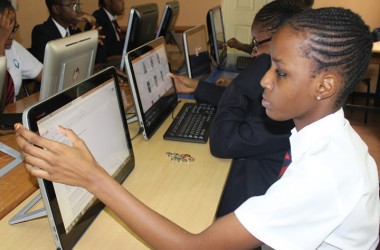
Every year between June and July, an annual event termed 'CODING DAY' is held to assess students understanding and capacity to create innovative applications and inventions using the power of codes. Its a global norm in many schools where students are encouraged to strengthen their computer programming skills in order to contribute in a world where its future depends on innovative Apps, Artificial intelligence and Robotics.This Hour of Code inspires thousands -- tens of thousands -- of students to fall in love with problem-solving, coding, technology in the classroom, and programming. Like a favorite web-based game, students are presented with a problem (for example, get your bot to say On vacation!) and are challenged to use technology in the classroom tools available to solve it. There are endless examples, from games to robots to programming technology in the classroom. No teacher can fail to find one exactly right for their students.
A good option that introduces coding at its most basic level is Game programming, where students are thought the logic and concepts of programming using visual elements and building blocks at the early stage. Such games introduced as a global standard learning tool are; KODU Gaming lab, Scratch, Project Spark, , Mine Craft and so on. These games have an overall effect of teaching students mathematical, logical computer skills that prepare them for a higher level of programming as they progress with the skill.
Futher on students move to more technical prgramming termed traditional programming where they focus more on Computer languages like Java, PHP, Python, SQL, Java script and so on. These languages are brought to bare when students learn practically how to build websites using HTML and Java script, before introducing down the road, Javascripts, CSS and databases for building more intelligent functionality to the website.
As students progress with the skill, they are allowed independently to introduce their own ideas, choose their area of concentration, form teams and work on innovative projects that are similar to those found in countries like INDIA, CHINA, USA and EUROPE. These projects could range from web apps, to gaming solutions and robotics, which could have practicable impact to any user, any where in the world as they are showcased.
The overall idea of coding is to provide a platform for students to build their IT skills and go further to transform their creative ideas into real world solutions and applications that can impact humanity.
Technology in the Classroom: What is a QR CODE?
Very simply, they are barcodes, not too dissimilar to those you see on the packaging of almost every product you buy. The main difference is that QR Codes can store much more data and more complex data in a smaller surface area. The code itself is an image file that can be copied, pasted, embedded, downloaded, and uploaded -- anything you'd normally do to an image file.
Most risks with QR Codes stem from the fact that they aren't readable by humans.
Why use QR Codes
There are valid reasons for using QR Codes in your classroom or as a teacher-author:
- High Capacity - they store a lot more data, allowing you to share real content and not just IDs or references.
- Require Less Space - you get the same data stored in a much smaller surface area.
- Dust And Damage Resistant - you can corrupt them but they don't damage easily. Even if that happens, because of the redundancies built in, there is a chance they are still readable.
- Readable From Any Direction - you can scan them from any angle; you don't need to be aligned to the orientation of the code.
- Structured Appending - for power users, data can be split over multiple codes which when scanned can be combined to reconstruct the original content.
Because they're so small, they're easy to embed anywhere. For example, for a school concert, you can turn the agenda into a QR Code that parents can open with their phones. No more papers to print, pass out, and toss at the end of the evening.


